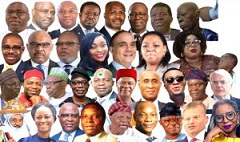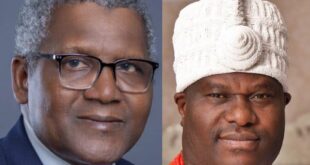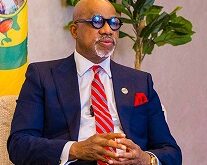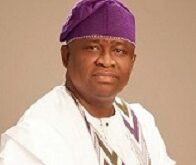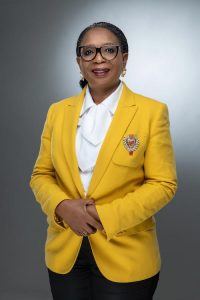
BY ABUSATAR HAMED
Some Publishers and Editors were specially invited to view a documentary production for the celebration of Firstbank’s 125 years (March 31, 2019) in Nigeria have commended the board, management and staff of the Bank for its giant stride in the country’s banking industry.
The epoch event which took place at Twinkles Lounge, Old Abeokuta Road, Abule Egba, Lagos on Sunday, December 20, 2020 was graced by Publishers/Editors from within and outside Lagos.
In her welcome speech at the event, the coordinator of the show, Mrs. Tosin Ajayi reiterated First Bank’s commitment on the development of socio-economy of Nigeria and Africa as a whole.
She thanked journalists on behalf of the Bank for their support and understanding, saying they should guide the relationship to blossom.
Earlier in his anniversary speech, the Group Managing Director of FirstBank, Dr. Adesola Adeduntan expressed the Bank’s gratitude to its customers for their unwavering support since its establishment, saying the Banks 125years journey in the industry is a huge milestone.
His words, Dear Nigerians, Thank you for your unwavering support as FirstBank, your bank, clocks 125 – a historical milestone in the annals of our history.
“125 years of supporting and enabling dreams, 125 years of resilience and relevance, 125 years of trust, safety and security, 125 years of long term value to all stakeholders, 125 years woven into the fabric of our society and therefore we dare say, 125 years beyond comparison!
“We mean it when we say FirstBank is You. As Nigerians, we have made history together and should be proud of this monumental feat because globally, very few institutions can boast such a rich and relevant heritage as a member of the over 100-year Club.
“We therefore invite every single one of you as stakeholders to join us in celebrating our Anniversary Year. We ask you to stand tall and claim this achievement with us as one more great thing out of Nigeria to the World; FirstBank since 1894.”
He stated further, “From our very modest beginning in 1894 as the Bank of British West Africa, we have traversed an incredible journey, delivering impeccable financial services to customers and supporting the building of the modern-day Nigeria and indeed, West Africa, including our early pivotal role as the monetary and fiscal policy regulator for the entire West African region.
“At the amalgamation, independence, and through the seasons ever since, we have been here marching hand-in-hand with you. We have enabled technological, industrial and societal advancements, achieving very many firsts; been resilient and supportive through periods of rapid and radical changes; pioneered and charted the course in our industry, nay, in the nation at large.
“From the Delta to the Savannah, from the confluence to the plateau, we are proud to be truly woven into the fabric of society.
“On behalf of the Board and Management of FirstBank, it is my honour and privilege to thank you and assure you that we look forward boldly and with great confidence and optimism to the next 125 years knowing we are here with you and for You and promise to remain truly the first by keeping You First. God bless Nigeria, God bless FirstBank of Nigeria!
First Bank of Nigeria Limited (FirstBank), the premier Bank in West Africa and leading financial services solutions provider in Nigeria was established in 1894, and is Nigeria’s number one Bank brand.
The Bank was founded by Sir Alfred Jones, a shipping magnate from Liverpool, England. With its head office originally in Liverpool, the Bank commenced business on a modest scale in Lagos, Nigeria under the name, Bank of British West Africa (BBWA).
In 1912, the Bank acquired its first competitor, the Bank of Nigeria (previously called Anglo-African Bank) which was established in 1899 by the Royal Niger Company. In 1957, the Bank changed its name from Bank of British West Africa (BBWA) to Bank of West Africa (BWA). In 1966, following its merger with Standard Bank, UK, the Bank adopted the name Standard Bank of West Africa Limited and in 1969 it was incorporated locally as the Standard Bank of Nigeria Limited in line with the Companies Decree of 1968.
Changes in the name of the Bank also occurred in 1979 and 1991 to First Bank of Nigeria Limited and First Bank of Nigeria Plc, respectively. In 2012, the Bank changed its name again to First Bank of Nigeria Limited as part of a restructuring resulting in FBN Holdings Plc (“FBN Holdings”), having detached its commercial business from other businesses in the FirstBank Group, in compliance with new regulation by the Central Bank of Nigeria (CBN).
FirstBank had 1.3 million shareholders globally, was quoted on The Nigerian Stock Exchange (NSE), where it was one of the most capitalised companies and also had an unlisted Global Depository Receipt (GDR) programme, all of which were transferred to its Holding Company, FBN Holdings, in December 2012.
Building on of its solid foundation, the Bank has consistently broken new ground in the domestic financial sector for over a century and two decades. FirstBank is present in the United Kingdom and France through its subsidiary, FBN Bank (UK) Limited with branches in London and Paris; and in Beijing with its Representative Offices there. In October 2011, the Bank acquired a new subsidiary, Banque International de Credit (BIC), one of the leading banks in the Democratic Republic of Congo.
In November 2013, FirstBank also acquired ICB in The Gambia, Sierra-Leone, Ghana and Guinea, and in 2014, the Bank acquired ICB in Senegal. These were major landmarks in its plan for growing its sub-Saharan African footprint and all the African subsidiaries now bear the FBN Bank brand.
As the global operating environment evolves, FirstBank has kept pace, responding to the dynamic needs of its customers, investors, regulators, host communities, employees and other stakeholders. Through a balanced approach to plan execution, FirstBank has consolidated its industry leadership by maintaining trans-generational appeal. Thus, the Bank has continuously boosted its customer-base, which cuts across all segments in terms of size, structure and sectors.
Leveraging experience spanning over a century of dependable services, FirstBank has continued to build relationships and alliances with key sectors of the economy that have served as strategic building blocks for the wellbeing, growth and development of the country. With its huge asset base and expansive branch network, as well as continuous re-invention, FirstBank is Nigeria’s strongest banking franchise, maintaining market leadership on all fronts in the nation’s financial services industry.
In the documentary shown to journalist, 93 years old Pa Folahan Olaolu Soetan got a much needed gift through the First Bank initiative – Start Performing Act of Random Kindness (SPARK) on March 1, 2019, 36 years after his retirement,.
His words, “I was asked to inform you that First Bank paid for the hearing device. I wasn’t expecting it. It’s by grace. As God chose me to be one of the recipients, it is surprising. So, help me to thank them. I also thank God. I retired in 1983.”
First Bank have this to say, “To the glory of God we want to celebrate, we want to be able to remind our stakeholders, our customers, our owners. I mean we have over 1.3 million owners.
“There’s no institution in Nigeria that had that kind of strength. We want to let the African continent know that there could be other banks from Nigeria, all of them took their reference from First Bank of Nigeria.
“In the late 19th century, the British company dominated the Atlantic, one of such company was Elder Demsper which specializes in Africa Trade and dominated the West Africa routes from Sierra Leone to Fernandoppo. Elder Demsper hired a young manager called Alfred Lewis Jones. He had already owned a smaller but successful shipping business. And demanded some share of Demsper company to come on board. The partners agreed and in time with further share purchase would soon take control of the company.
“In the 1890’s, Alfred Jones and Elder Demsper decided to go into banking in the West Africa region and acquired the failed Lagos operation of African Banking Corporation forming what will become British West Africa in 1894. The first office was in Marina.
“According to Edward Marlow, the great grand nephew of Alfred, Alfred Lewis Jones is actually a ship owner, and one point owned what was the largest shipping company in the world, the Elder Demsper Line.
“And by the time he died, he was probably one of the most prominent Victorian businessmen. He set up what became the Bank of British West Africa because he needed a Bank in West Africa to help facilitate his trade etcetera.”
Hear what people say about First Bank Plc in the clip; UK EKE, MFR (GMD First Bank Holdings Ltd) said, I think there four critical roles that banks play; the first will be Safekeeping of deposit and valuables, The second will be facilitating payments, the third will be making Loans and of course the fourth will be making investments on behalf of clients”.
In the early twentieth century, the Bank of British West Africa expanded across the region aggressively opening up branches in Calabar, Zaria, Accra, Sierra Leone, Kano and many more. In 1914, when the Kano branch was opened, an illustrious merchant showed up with three camels loaded with 20 bags of silver which were all deposited that day.
Muhammadu Ibrahim MFR (Non- Executive Director FBN) noted: “Now when we were small children here in middle school, we would always ride bicycle or sometimes come on foot.because of the great edifice that was a dome. It used to be called Banki Nai Tulluwa (Bank with the dome). So this old dome was something to come and watch throughout the North”
By the 1920’s when when many were beginning to agitate against the colonial govt for unfair taxes, the bank supported everyday Nigerians in all forms of Agriculture, trade and services. By now the bank had grown to a customer base of over a hundred thousand and had become the treasury for the govt as the central bank of Nigeria for many years.
Ibukun Awosika (Chaiman, FBN) said: “I can honestly say that you have to be on the side of the bank to understand what a great institution it is and when I say institution, I mean an INSTITUTION. Think of how many different ‘future’ First Bank has gone through. Imagine when it was ten years old, the environment it was in.
“1894, by 1904, what did this region look like? By the time you get to Amalgamation and all of that in 1914, you could only anticipate what was going to happen next. When you walk through all of those seasons into the season of independence of the country, think of the seasons where we had a lot of cash crops and everything and the kind of development and nature of the country and the region and the emergence of petrodollar and the different political systems whether military or whatever we had over time.
“And think of an institution that had continuously re-engineered itself effectively for each future that it had to encounter and successfully do it”.
Soetan noted that: I was employed into the service of Bank of British West Africa in the year 1949 at Kaduna. When I joined the bank, it was manual; you had to write everything with ink and pen. The ledger, you will the name in capital, everything in capital and much depend on how well your writing is and how well you can plan”.
Adesola Adeduntan (CEO, FBN) said: “For First Bank, one think that stands us out clearly is that for an institution that is 125 years old, we’ve remained very relevant.
“Encoded within the DNA of this institution is our capacity and ability to invent and re-invent ourselves. This bank is strategically positioned to remain the dominant financial institution not just in Nigeria, but in the West and Central part of Africa where we have decided to play for now”.
“Profitability is very important, but economic growth and development is equally very important for us, given our history because we are woven into the economy, we are woven into the entire society”.
Building the Nigeria we know today didn’t happen overnight, it took well over a century, hundreds of thousands of people, millions of man hours and billion of pounds, shillings naira and kobo. From roads to bridges to dams, First Ban was there financing them all the way. We were there with the groundnut pyramids and cash crops of the 1930’s and we continue to finance agriculture till today spending over 200 billion naira on seeds and agricultural equipments for farmers.
We were there when the first power lines were set up and even now, we were the key bank in the privatization of the power sector in 2014. We financed the first major railway project that moved Nigeria from one end of the country to the other. We also financed the Niger Bridge which still stands today as a link between major cities and today we also responsible for some of the largest infrastructural projects both public and private.
Segun Agbaje (MD GTB), son of J.K. Agbaje, first appointed African Branch Manager of First Bank said: “There are very few banks truthfully that I have a lot of respect for because I don’t think that a lot of banks are necessarily doing banking this way I would like it be done and that probably one of the four or five banks that I think are doing banking properly in Nigeria is definitely First Bank and that if GTB was able to have the staying power and the strength, and the brand and the trust that obviously First Bank has, then, I think it would have very well”.
“The latest competition I have with FBN is over NIP volumes, I think that last year, we controlled about 25% of NIP and FBN was about 18%, today they’ve used their retail base to go up to about 22.9% of NIP, I think we are about 20.9”.
Olufemi Shoaga (Customer) was of the opinion that: “I always liked First Bank. I trust First Bank because the people I trust are also in FirstBank”.
Nike Oyelola (Staff, FBN) said: “I would say that FBN is a wise person, a very experienced person, a very society family oriented person, a very resilient person. And I think that is the reason FBN has thrived for so long”.
HRM Igwe Nnaemka Alfred Achebe MFR (Obi of Onitsha) disclosed that: “My first relationship with FBN is through my father because my father also banked with FBN. So, when I was in the primary school, he would send me to the bank with a little note to the manager, the manager would then put some money in an envelope and give me to take back to my father. So, I used to run errands for my father to FBN which was his bank and so on.
“My own direct connection with FBN was 13th of March, 1972, and I have maintained that account till today. FBN has always set the standards. It has had a dominant effect in the economy of Nigeria, in the banking industry in Onitsha being a trading center, a trading town, it has a dominate effect”.
HRM Emir Muhammadu Sanusi II, CON (Former GMD, FBN 2009, Former Governor, CBN 2009-2014) said: “Sometimes, I look at your numbers, I know that the profit don’t look very high but you look at the revenue numbers, and you are not doing worse than everybody else. And it is good that you are having the revenues and you are taking all the charges and cleaning up your balanced sheets because that is really what one expects of FBN to clean up the balance sheet, have strong capital”.
“Obviously, I am a Prince, and this is an inherited position, but to the extent that you are not the only eligible candidate, being Governor of Central Bank, having achieved that level in public service also helped in the selection process. So, FirstBank gave me my break by making me an ED which then set me up on the path to being where I am and I remain a FirstBanker”.
Patrick Iyamabo (Chief Financial Officer, FBN) have this to say: There is no taking away the fact that we are the systemically relevant bank, in other words, the scale of our business operation influence in this market means that should anything go wrong with FBN, you will have systemic reverberations. That’s the reality”.
Over the last century, FBN has recorded consistent growth and developed into an institution has become a reference point for success in banking industry. But just how big truly is FirstBank?
First Bank has by far the largest customer base of banks in the country with over sixteen million customers even more amazing is that there are only fifty million banked people in the country and 24 other banks. This means that even though we are only one in 25 establishments over a quarter of all customers choose First Bank.
That is because FirstBank is truly the First, we put you first.
Over 20,000 locations (branches and banking agents) spread across all 774 local government areas of the 923,763 square kilometers we call Nigeria. This is not just the largest by far but amazingly, it means on average, there is FirstBank location less than 7 kilometres in every direction. If it were possible, FBN will be the only bank to have two locations on the Third Mainland Bridge in Lagos. – We are everywhere.
The true measure of financial institution is security which is the foundation upholding everyone’s risk. Here, FBN by far has the largest foundation with 5.3 Trillion naira asset base. With us your money is always safe.
For over a century, FirstBank has supported so many businesses of different scales from large size conglomerates to small businesses that form the engine of the economy. Bank of British West Africa, Bank of West Africa, Standard Bank and now FirstBank has by far been the biggest partner to businesses in Nigeria trying to list all their partners and discuss their contributions to each might take us another century.
Mr John G. Coumantaro (Chairman, Flour Mills Plc) said: “Our Flour Mills has been around since 1960, almost 60 years, not quite as long as 125 years, interms of the sheer sale and size of operations. FMN is one of the largest food and agro allied business in the nation employing over 12,000 of people.
First bank is in ever community in the nation and that is how we like to think of ourselves as well, we have our products in every community in the nation.
“The institution of FirstBank is actually a building place for leaders, we have produced Central Bank governors, we have produced Ministers, and we have special advisers to the government. We have produced kings, chiefs, emirs. We have the Emir of Kano.
“John Major (Former British Prime Minister) and former FBN staff: But before John Major became Prime Minister, he was former Jos branch staff in 1967.”
According to the former MD/CEO, FBN 1992 -1999, former Governor, Central Bank of Nigeria 1999-2004), Joseph Sanusi, “Samuel Asabia (First Indigenious MD of FBN – 1977-1984) was the one behind the building of that head office, and he did it without enriching himself.
“Some people thought that maybe he was foolish to do that, I said that is the sort of foolish man I want to be, to be able to leave that sort of legacy and with a character that is untainted”.
Jacobs Ajekiigbe, OFR (Former MD/CEO, FBN 2002-2008 said: “Those two gentlemen, Chief Asabia and Chief Sanusi, they were people who actually influenced the way I respond to issues and the way I carry myself.
“Chief Sanusi is my mentor, and I’m sure, he will be happy with me also if you ask him but I know that he has done a lot for the bank”.
Tijani Borodo (Former Company Secretary, FBN Holdings Plc have this to say: “So you see, there is that family culture in First Bank and it’s one of the things that I can say that has kept me going in the institution for these years”.
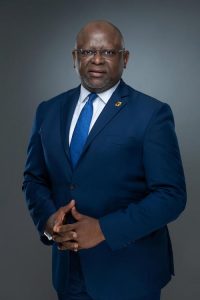
Folake Ani-Mumuney Group Head, Marketing and Corporate Communications said: “We are proud of what we have achieved. We have ensured that we have touched the nation in so many different ways around health, education, welfare. There is almost no sector or no area you wouldn’t see where we’ve delivered and created value.
“We have an initiative currently called SPARK (FirstBank staff are major contributors to the SPARK initiative), and what does SPARK for; it stands for Start Performing Acts of Random Kindness. The impact has just been numerous across the country. One of the things we are proud of is that we truly reach all the nooks and crannies of Nigeria, but beyond Nigeria, our Sub-Saharan African markets as well are recording the same sort of significant success in terms of the CSR impact.
“So, we started with piloting it first with our staff and it was ‘Staff Performing Acts of Random Kindness’ and we amazed at what came out of it”.
Abimbola Koleosho (FBN Staff) said: “I always have that passion to help disadvantaged people in any little way I can”. So every Sunday when I go to church I see the girl my heart bleeds and I knew that I had to do something. So when the SPARK initiative came up about that time so it was an ideal situation for me, I nominated her and submitted the details and behold she was chosen.
Kate Ogbonnaya (Recipient of FBN SPARK Initiative) said: “I showed a member in my church that works with FirstBank. So, I narrated the story to her that my baby is having a hole in the heart and I don’t know what to do. This is baby Ijeoma Gold Ogbonnaya Before she cannot talk, she can’t walk, she can’t even move, but after the surgery she talks, she eat well and walks now.
Babajide Olusesi (Staff FBN) was of the opinion that, “I would say that I am particularly happy about our CSR initiatives, for me I believe the measure of a person is in how much they give back you know there is only so much you can take for yourself as much as we are bank, our business is making money but we also do a lot in the area of CRS we do things regarding autism and a bunch of other health initiatives that I particularly like and also SPARK just thing to give back the community and just to ensure that people around us are, you know feeling our impact”.
Ajibola Afonja (Formal Chairman FBN Limited) enthused, “There are many cases of the extension of corporate social responsibility to institutions which impact on the institution as a whole I remember one time when FirtBank bought a number of buses, school 28 seater buses, for schools secondary schools, and higher institutions in Nigeria and I know that meant a lot to a lot of institutions”.
Infact FirstBank may just have a Guinness Book of world records on its hands. We have sponsored the annual polo tournament at the Kaduna polo club for ninety-nine years consecutively and this year mark one hundred years (Proud Sponsor of the FirstBank Georgian Cup for 100 years).
We have also been sponsoring the annual Golf Tournament at the Ikoyi club for 57 consecutive years, also a possible world record, be it business or lifestyle, be it health, education or sports, it is impossible not to find FirstBank woven into the very fabric of the Nigeria society.
Number one point is the Corporate Governance.
Kayode Akinkugbe (Managing Director FBNQUEST Merchant Bank Ltd) noted. He said that Corporate Governance, very strong governance architecture and so for me I think that was something that was quite appealing from the very beginning.
Alex Otti (Former Executive Director, FBN and former CEO Diamond said: “One of the major takeaways for me was the degree of application of corporate governance standards and FirstBank’s longevity can be traced to its corporate governance principles.
Emeka Emuwa (CEO Union Bank) posited: “You don’t get to be 100/125 years old without having a very solid foundation. The pioneer banks, FirstBank and Union Bank, they built on solid fundamentals and that has helped over time to deliver value, engender goodwill with generations of Nigerians”.
Bisi Onasanya (Former GMD, FBN – 2009-2015): “I can tell you for free that there is almost a rule book that guides every single thing about FirstBank. Even as a Managing Director or Chief Executive, there are things in that rule book written and unwritten that you dare not touch, that even the system will not allow you.
“FirstBank is the only Bank that I know that an MD will give an instruction and a junior officer will politely decline to carry out that instruction if it’s not in accordance with the principles and policies of the Bank”.
“My thought about Banking in the next 125 years, there won’t be any banks. I think banking will be a mere thought in people’s minds, I think banking would have been consigned to the garbage bin of history”.
Val Ojumah (MD/CEO, FBN Insurance Ltd) said: “FirstBank tries to renew itself continuously. Every three to five years, you will see something new happening in FirstBank”.
Bridget Omokhayi (Staff) noted:“If you look into the past, you’d know that FirstBank was this big Elephant who could barely move due to its sheer size and then we transformed into the Elephant who is now so agile because our trunk is raised and one leg is raised up. So, I see FirstBank in the future as an Elephant that will fly, I think the world just needs to watch”.
Gbenga Shobo (Deputy Managing Director, FBN) said; “Clearly, we are in the digital age and we have done a good job of moving from maybe I will call it the manual age into the digital age. I have just told you that debit cards for example; ten million cards – maybe we are the second in Africa, that’s major.
“Mobile banking, we have most number of mobile banking customers. USSD which was only started off two/three years ago, we have the most number of customers on USSD. We’ve just started agency banking, we already have fifteen agents. Nobody else in the country is near us”.
FirstBank introduced the Automated Teller Machines (ATM) to Nigeria. We also brought Western Union into the country. And now PRIMUS, to ensure we harness the power of technology in preparing for banking of the future.
Bola Adesola (Senior Vice-Chairman, Africa, Standard Chartered Bank, Former Executive Director, FirstBank) said: “Banks would be sort of brand agnostic, the banks themselves would be the devices that we hold. They could be implants under our skin; it could just look at somebody and through our eye contact, transferring money”.
“We may not have branches on Third Mainland Bridge or at the top of Zuma Rock or in the dense valleys of Enugu but we are everywhere and We are proud to be Nigeria’s First and Best Bank.
“We’ve got a great future ahead of us, and as I congratulate you about 125th anniversary, I challenge you concerning the future”.
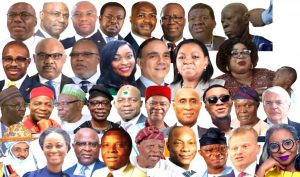 Bello Maccido (Chairman FBNQuest Merchant Bank Ltd) said: “My prayer is that this institution will not only retain its pre-eminent position but that it will become the undisputable leader, undisputable provider of all financial services in all of Africa. This is my prayer”.
Bello Maccido (Chairman FBNQuest Merchant Bank Ltd) said: “My prayer is that this institution will not only retain its pre-eminent position but that it will become the undisputable leader, undisputable provider of all financial services in all of Africa. This is my prayer”.
“It is a rare privilege to be the Chief Executive Officer of this iconic institution at this particular point in time and as we build for the next 125 years, our assurance to all our stakeholders is that we are building all the necessary capabilities that will ensure that in another 125 years, this bank, our bank, FirstBank, will remain a dominant player within the banking landscape, not just in Nigeria but in the whole of Africa”.
“So, this time around, we are celebrating the establishment date. Happy birthday, Happy Memorial Day. All the best, all the time”.
“I wish us all many many happy returns, and I hope we enjoy ourselves as we celebrate. Many happy returns”.
 Startrend International Magazine For Your Latest News And Entertainment Gists
Startrend International Magazine For Your Latest News And Entertainment Gists


